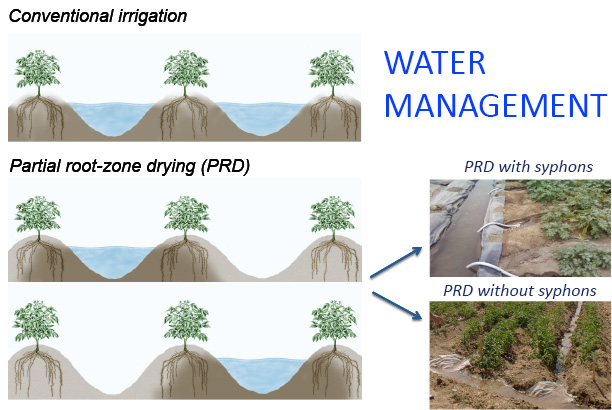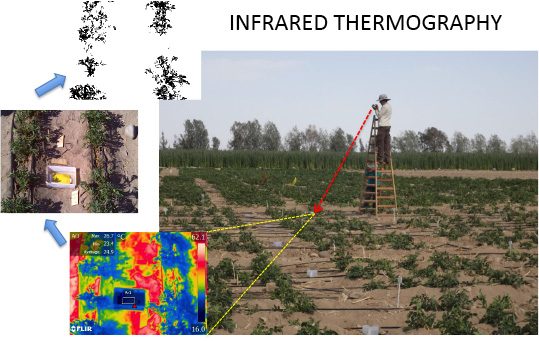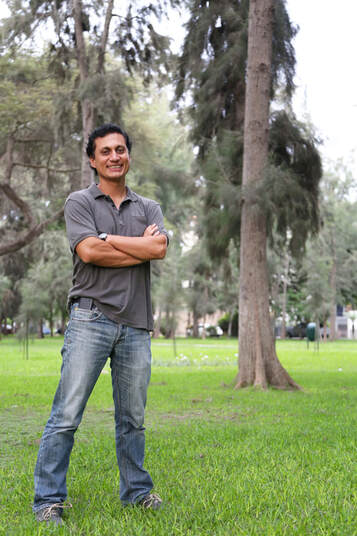
CURRENT POSITION
SCIENTIST, INTERNATIONAL POTATO CENTER - CGIAR, Peru
EDUCATION
2006 Dr. University of Alicante - Spain
"Ecosystem and biological diversity management
and restoration program"
2000 BIOLOGIST Universidad Nacional Agraria La Molina
Peru
HONOURS
- Winner of the Merit Award Santiago Antunez de Mayolo Gomero 2015 in the category "Research in Science" awarded by the National Council of Science,Technology and Technological Innovation of Peru and Peruvian National Academy of the Sciences.
- Short-list in the category of “Young Promising Scientist” nominated for the Louis Malassis Scientific Prize 2015
- Second Prize to Young Scientists in Basic Sciences, Edition 2011, destined to the area of Biology. The Academy of Sciences for the Developing World (TWAS) and National academy of Science and Technology of Peru (ANCYT)
PROFESSIONAL EXPERIENCE
2023-Present Senior Scientist, International Potato Center, Peru
2015-2023 Scientist, International Potato Center, Peru
2011-2022 Visiting Lecturer, Water Resources Doctoral Program, UNALM, Peru
2016-2018 Visiting Professor, Gansu Agricultural University, Lanzhou - China
2012-2015 Associate Scientist, International Potato Center, Peru
2009- 2012 Visiting Lecturer, Biology Department, Universidad Nacional Agraria La Molina (UNALM), Peru.
2008 - 2011 Lecturer in Ecology, Environmental Science Department, University of Castilla-La Mancha, Spain.
2015-2023 Scientist, International Potato Center, Peru
2011-2022 Visiting Lecturer, Water Resources Doctoral Program, UNALM, Peru
2016-2018 Visiting Professor, Gansu Agricultural University, Lanzhou - China
2012-2015 Associate Scientist, International Potato Center, Peru
2009- 2012 Visiting Lecturer, Biology Department, Universidad Nacional Agraria La Molina (UNALM), Peru.
2008 - 2011 Lecturer in Ecology, Environmental Science Department, University of Castilla-La Mancha, Spain.
AREAS OF INTEREST
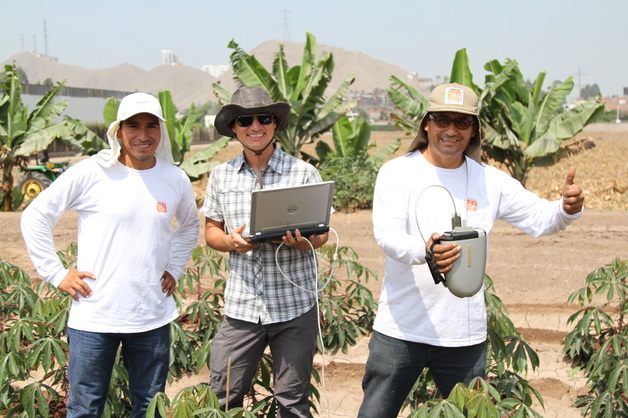
Part of the staff of the CIP- Crop Ecophysiology and Modeling Laboratory assessing plant reflectance in cassava.
I am head of the Crop Ecophysiology and Modeling Laboratory of the International Potato Center (CIP). Our research involves the identification and measurement of key functional processes at leaf, plant and ecosystem scales, with the aim of improving crop intensification through better management of agricultural resources. Specifically, I am interested in leaf physiological traits, water management, drought tolerance, modeling, water relations and gas-exchange (carbon and water) from leaf to canopy and functional ecosystem processes. My present research try to answer the following questions:
(From left to right: Nikolai Alarcón, David A. Ramírez and Jesús Zamalloa)
a) What is the most appropriate water management which allows significant irrigation water savings without tuber yield reductions?
b) What are the leaf traits that denotes plant functional response to drought in cropping systems?
c) How does resilience building helps in solving the dilemma of increasing water restriction for agriculture in the face of increased food demand?
d) How does vegetation structure (richness, ecological diversity and others) interacts with multifunctional ecosystem processes?
b) What are the leaf traits that denotes plant functional response to drought in cropping systems?
c) How does resilience building helps in solving the dilemma of increasing water restriction for agriculture in the face of increased food demand?
d) How does vegetation structure (richness, ecological diversity and others) interacts with multifunctional ecosystem processes?
CURRENT RESEARCH LINES AT THE INTERNATIONAL POTATO CENTER (CIP) – CROP ECOPHYSIOLOGY AND MODELLING LAB
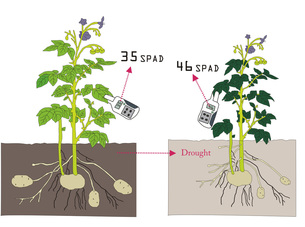
I. Key plant traits related to drought tolerance
Growing potato in dry agro-ecologies is a challenge, but when successful, smallholder farmers dramatically increase income. Introduction of drought tolerant varieties and appropriate water management under those conditions are two areas where CIP is conducting research. We are searching for integrative traits that could facilitate selection of drought tolerant genotypes and water tolerance thresholds in those varieties. In the paper by Ramirez et al. (2015a, see video abstract), we showed that carbon 13 isotope discrimination in potato leaves, prior to tuber initiation, can be used to establish physiological status under different water restriction conditions whereas in the tubers provide breeders with and integrative selecting tool for drought tolerant genotypes, very early in the phenology of the plant. On the other hand, the ability to delay senescence -i.e. low rate of chlorophyll reduction and a late senescence onset- seems to be an important trait related to drought tolerance in potato. In the papers by Ramírez et al. (2014) and Rolando et al. (2015, see video abstract) we evidenced that the genotype that maintained the highest yield under water restriction conditions showed the longer period of biomass accumulation driven by its long growing cycle with a concomitant delayed senescence. Leaf greenness temporal rate (a surrogate of senescence) can be used by drought phenotyping programs as an important drought related leaf trait but taking into account the drought scenario.
Growing potato in dry agro-ecologies is a challenge, but when successful, smallholder farmers dramatically increase income. Introduction of drought tolerant varieties and appropriate water management under those conditions are two areas where CIP is conducting research. We are searching for integrative traits that could facilitate selection of drought tolerant genotypes and water tolerance thresholds in those varieties. In the paper by Ramirez et al. (2015a, see video abstract), we showed that carbon 13 isotope discrimination in potato leaves, prior to tuber initiation, can be used to establish physiological status under different water restriction conditions whereas in the tubers provide breeders with and integrative selecting tool for drought tolerant genotypes, very early in the phenology of the plant. On the other hand, the ability to delay senescence -i.e. low rate of chlorophyll reduction and a late senescence onset- seems to be an important trait related to drought tolerance in potato. In the papers by Ramírez et al. (2014) and Rolando et al. (2015, see video abstract) we evidenced that the genotype that maintained the highest yield under water restriction conditions showed the longer period of biomass accumulation driven by its long growing cycle with a concomitant delayed senescence. Leaf greenness temporal rate (a surrogate of senescence) can be used by drought phenotyping programs as an important drought related leaf trait but taking into account the drought scenario.
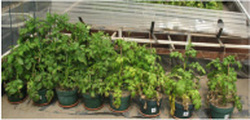
II. Long-term water stress memory in potato and Sweetpotato
Stress memory in plants is a phenomenon related to how previous exposure to different types of stress (priming) can alter subsequent responses to future stresses and condition the plant to more effectively respond to them. Long water stress memory in potato plants subjected to water restriction, expressed in tuber yield in the subsequent clonal generation, has been reported by our team (Ramírez et al., 2015b). Thus also, the successfully short-term memory induction in sweetpotato wild relatives reported in our recent paper opens an excellent opportunity for drought tolerance induction in this important crop in Breeding programs. However, more studies are necessary to understand the underlying epigenetic mechanism of the long-term stress memory induction and identify other priming techniques based on the pre-treatment with mild stresses of sexual seeds or in vitro plantlets. We think that these studies are essential for crop and seed management oriented to improve water restriction response in potato in the face of climate change.
Stress memory in plants is a phenomenon related to how previous exposure to different types of stress (priming) can alter subsequent responses to future stresses and condition the plant to more effectively respond to them. Long water stress memory in potato plants subjected to water restriction, expressed in tuber yield in the subsequent clonal generation, has been reported by our team (Ramírez et al., 2015b). Thus also, the successfully short-term memory induction in sweetpotato wild relatives reported in our recent paper opens an excellent opportunity for drought tolerance induction in this important crop in Breeding programs. However, more studies are necessary to understand the underlying epigenetic mechanism of the long-term stress memory induction and identify other priming techniques based on the pre-treatment with mild stresses of sexual seeds or in vitro plantlets. We think that these studies are essential for crop and seed management oriented to improve water restriction response in potato in the face of climate change.
III. Effective water use through water management and physiological thresholds for irrigation
COURSES TAUGHT
- "Seminar on Water Resources II - Scientific writing", Water Resources Doctoral Program, Universidad Nacional Agraria La Molina, Peru
Click to set custom HTML
